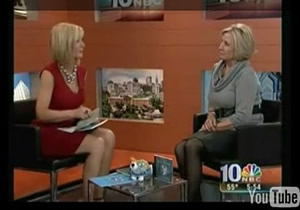I stumbled onto a marvelous blog called Everyone Needs Therapy. It is written by a savvy woman who happens to be a PHD. The following is her most recent blog entry:
The Deception Detector
Sometimes I talk to nice young men and women about what they’re looking for in a partner and the idea of honesty pops up as a good thing.
But no one seems to know how to go about finding out if the person that they’re dating or going to date is honest or not. And these days, if you meet online, you’re at a real disadvantage. The picture, to begin with, is almost always a lie.
But maybe that’s not fair. An old picture isn’t such a big lie. That’s not the kind of deception I’m talking about here.
Years ago I wanted to write this book, The Deception Detector. I think there is a book on the subject at Borders now if you want to take a look, but I haven’t read it, so I can’t recommend it. In fact, there’s a book about every conceivable psychological/relational topic, and if there isn’t, and you write it, it’ll get published.
So here’s what you have to do to find out if a person has a predisposition to deception.
Let’s just use him, for the sake of convenience. We could have said, her.
You go out to dinner. You really have to be able to see him. You sit across from him You playfully ask, So when you were a kid, can you remember the first time you lied to your parents? Or the first time you did anything you weren’t supposed to do?
He’ll probably tell you. People love to talk about themselves, and when they’re talking about what they did as children, they assume you know they’re different, now. So no matter what he says, you act like that’s fine, after all, kids do lie to parents to differentiate, and to teachers to survive. And you indicate that. That it’s all right.
After all, it’s not necessarily a sign that this is how a person will behave as an adult. Personality is determined by the resolution of the deception. Deception is really passive conflict. It’s not the act so much, as how it’s resolved.
Then you ask him, So tell me more! When was the next time?
And you’re fascinated, of course. It is interesting, isn’t it? This is the job, by the way, of dating, getting to know someone, finding what’s interesting about him or her.
So you keep asking and get all the stories. And while you’re getting the stories, find out how each act was resolved. Did parents find out? Did teachers find out? Did each lie lead to another or was there a time when everyone talked about it and the liar thought to himself, This is silly! Why am I doing this? I’m lying to myself, too!
When that happens, when we look at ourselves and think, I could hold my own in a truthful argument, we start telling the truth. We risk looking bad.
It’s a lack of confidence and the certainty that we’ll lose something that makes us lie. And of course, fear of exposure and maybe abuse. Lying is the opposite of intimate, so it works nicely if you want to screw up your relationships.
Or did he learn, This is smart. I get farther in life this way. This totally works.
You have to find out. If that moment of truth never happened? It won’t with you, either.

